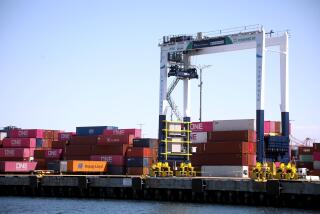In Support of Energy Plan, White House Burns Some Gas
- Share via
MONROEVILLE, Pa. — With his top officials dispatched to several states to try to recharge the White House’s coolly received energy policy, President Bush on Monday conceded that the plan may be a harder sell now that oil prices are down and California is experiencing fewer rolling blackouts.
“Any time there’s not an immediate problem that’s apparent to people, it’s tough to convince people to think long-term,” Bush said.
Vice President Dick Cheney, the plan’s chief architect, joined other top administration officials and Republican members of Congress in public meetings to bolster support for the initiative.
At a town hall meeting in this Pittsburgh suburb, Cheney, suffering from laryngitis, used his ailing voice to warn that a failure to generate new energy would be a “storm cloud out there on the horizon for the American economy.”
Earlier in the day, in comments delivered by his wife, Lynne, a last-minute stand-in, the vice president offered a retooled message about conservation that signaled a marked change from his comments of just a few months ago.
“Conservation is a must,” Lynne Cheney told a conference of county executives gathered in Philadelphia, reading her husband’s speech from a TelePrompTer.
Previously, Cheney touted supply-oriented solutions and dismissively called conservation a “sign of personal virtue” but “not a sufficient basis for a sound, comprehensive energy policy.”
Those comments, as well as Cheney’s former role as head of a Texas-based oil supply company, had made the vice president a target for foes of the White House approach. And in the last few months, between problems with his heart and the flap over his conservation remarks, the man considered by many to be the most powerful vice president in history had been less visible on the national stage.
But he was front and center Monday--hoarse voice notwithstanding.
Elsewhere, Energy Secretary Spencer Abraham, Interior Secretary Gale A. Norton, Transportation Secretary Norman Y. Mineta and Environmental Protection Administration chief Christie Whitman made town hall appearances from Connecticut to South Dakota.
Democrats on Capitol Hill criticized the public relations blitz, saying the massive tax cut will make it difficult to fund any conservation initiatives. An energy bill dealing with nuclear energy, hydropower, clean-coal technology and conservation is scheduled to come before the House Energy and Commerce Committee today.
They also questioned why none of the president’s surrogates were dispatched to the region struggling the most with energy supply needs: the West Coast.
“Out of 105 recommendations in the [administration’s] plan, not one is relevant to the situation in California, Oregon, Washington or other parts of the West,” said Rep. Bob Filner (D-San Diego).
In front of a friendly audience under hot lights in the gymnasium at the Community College of Allegheny County, Cheney strained his voice to answer questions.
In one of the night’s few sharp moments, Pennsylvania Gov. Thomas J. Ridge, a Republican, took a swipe at California, noting: “We weren’t the first state to deregulate natural gas or electricity, but we were the first state to do it right.”
Cheney again pushed many of the same tenets of the policy his energy task force unveiled this spring: responsible exploration and production, the need to reduce dependence on foreign oil sources, and the role new technology can play in meeting energy demands.
At the day’s first event, he watched from the sidelines in Philadelphia as Lynne Cheney, taking his place at the lectern, reiterated the administration’s strong opposition to the Kyoto treaty.
“President Bush agrees that the approach of Kyoto was flawed and unworkable,” she said on the eve of the president’s second trip to Europe, where the U.S. position is controversial. “It would have produced little or no net benefit to the global environment, while imposing massive job losses on the American economy.”
But the same speech contained his most extensive and positive comments to date about the role of conservation during an energy crunch.
“This is one of the guiding principles of the president’s energy policy: making better use of energy, through conservation and the latest technology,” his wife said for him.
The administration’s stress on conservation, however, came with caveats, both from Bush and Cheney.
During an Oval Office ceremony where he received a bust of Winston Churchill, Bush sounded a note of caution about California’s woes.
“It should be worrisome to people that the state that’s had the best conservation efforts is the state that’s had brownouts,” Bush said, emphasizing the need for a long-term energy policy that includes developing new sources of energy.
Cheney’s speech warned that he and Bush “do not accept the false choice between more energy and a safer environment.” And during the brief time Cheney used his own voice Monday, he once again pointed out the reality of current U.S. energy needs when it comes to petroleum.
“The fact of the matter is we are dependent and will be dependent on gasoline,” he said.
For some of the White House’s biggest environmental critics, the subtle policy shift expressed Monday didn’t change any minds.
“Conversions begin with lip service,” said Carl Pope, president of the Sierra Club. “But all we’re seeing so far is lip service. I hope we see more.”
*
Times staff writers Edwin Chen and Richard Simon contributed to this story from Washington.
*
RELATED STORIES
Discount: Churches help Edison spread word to poor people. B6
Edison rescue: Legislature works on alternatives to Davis’ plan. B7
Power trip: Available electricity and low rates give L.A. an edge. C1
Lighten up: Campaign is aimed at countering state’s dark image. C2
More to Read
Get the L.A. Times Politics newsletter
Deeply reported insights into legislation, politics and policy from Sacramento, Washington and beyond. In your inbox twice per week.
You may occasionally receive promotional content from the Los Angeles Times.








